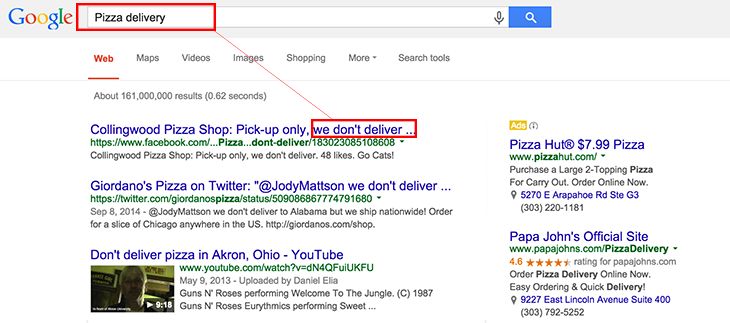Being the Top Search Result on Google: Local vs National SEO

In a previous post, we mentioned that being the top search result on Google is today valued at about $1,000,000. To back up this claim, we mentioned that all the research we’ve conducted, plus all the research of the smart people we follow, points to the fact that there’s no magic bullet for SEO anymore. Gone are the days when you could just keyword stuff to trick Google into thinking you have the best content. Google has gotten better and better at delivering optimized content to its users, which means it’s harder and harder to achieve real results in Google search results, especially for small businesses.
This doesn’t mean you should give up on being the top search result on Google, however, it just means the rules of SEO have changed and so you need to play a different game.
Understanding SEO Today: Local vs National Audiences
The thing that a lot of folks misunderstand about SEO today is that there are actually two audiences for search results: local audiences and national audiences. The current versions of major search engines like Google, Bing, and Yahoo key into location when returning search results. This means if your customers are searching for something like “shoe sales,” they’re as likely to get results from local shops (assuming those shops have optimized for SEO) as they are to get results from national brands.
Search engine developers know that people aren’t always looking to shop online, or to shop national brands online, so they’ve provided lots of opportunities for local brands to do well in search results when users search for local keywords like “shoe sales near me.” They’ve also accounted for location in search results, meaning that users get served more and more results relevant to their immediate proximity. This also means that depending on who you are trying to sell to, local audiences, national audiences, or some combination, you need to think differently about the way you deliver content on your website.
What to Focus on to Improve Your Ranking Locally and Nationally
Ideally, you want to appeal to both local and national audiences, because the ranking factors are largely the same for both. Frequent changes to the algorithms that search engines like Google use make national SEO very hard for small businesses.
That being said, based on the research of thought leaders like Capala, and our own independent research, the key ranking factors to focus on right now are:
- Usage of keywords that are competitive for your industry (the ones people are searching for)
- Posting fresh, high-quality content on a regular basis (think of in-depth articles on newsworthy topics pertinent to your industry)
- Usage of local identifiers (place names, geographic names, regions, etc.)
- Mobile-responsive design (Google now penalizes sites that aren’t mobile-responsive)
- Backlinking (linking to other sites that link back to yours)
- Internal linking to root pages (or hubs for specific keywords) within your own website
- Usage of the correct code attributes in your website (keywords, unique titles, alt tags, meta descriptions, etc.)
Though SEO is more difficult right now than it was even a few years ago, anyone with a website should be using these factors to improve their SEO. There’s simply no reason not to do these things to improve your search ranking. Failure to do so means that you will simply receive less traffic to your website.
Improve Your National SEO, but Don’t Neglect the Local
Since national SEO has become so competitive, this also means that you should ensure you’re making local SEO a priority. You might be able to rank well for local searches, in other words, even if you’re ranking poorly for national searches. There are also some factors that are distinct to local SEO and that have less impact on national SEO, but certainly don’t hurt it. Besides keeping the above factors in mind, you should also keep these additional factors in mind.

Though he was writing for that ancient era of 2015, Casey Meraz gives the following tips for making the most of local SEO:
- Make sure your business is listed correctly on Google My Business
- Solicit your existing customers for reviews on popular sites like Google and Yahoo
- Consider investing in a service like Get Five Stars to ensure the first reviews customers see when they search for your business are positive ones
- Optimize your photos for local audiences to highlight what you have to offer customers in your immediate area
- Make sure the titles of posts and pages on your website encourage local audiences to take actions you want them to take (click for a special offer, learn why you’re the best at what you do, etc.)
- Make sure the meta descriptions of posts and pages on your website also appeal to local audiences
- Don’t ignore third-party sites that show up on search results such as Yelp and industry-specific review sites (i.e. Health Grades for physicians).
SEO Is Hard, But Ignore it at Your Own Peril
There are many small businesses out there, and even some national brands, who decide that SEO is simply too much trouble. If they do commit to SEO, they trust that whoever is building their website knows the current ranking factors well enough to ensure their website will perform well in search results.
This is not always a safe assumption. Unless a firm specializes in SEO, don’t assume that they know the current ranking factors. If you’re not sure, do some independent research and then quiz the firm to see if they know their stuff.
If one thing is certain, SEO will only grow in importance as people increasingly rely on mobile devices to find businesses near them when they’re traveling or are otherwise out and about. Businesses that neglect SEO risk losing real revenue as their competitors show up above them when prospective customers search online.



3 Local SEO Tips for Small Businesses in 2016 - Content Garden
September 21, 2016 @ 9:10 am
[…] we mentioned in a previous post, there are really two kinds of search engine optimization: local SEO and national SEO. National SEO […]
Digital Marketing Fundamentals Everyone Should Know - Content Garden
July 19, 2017 @ 7:45 pm
[…] Being the Top Search Result on Google: Local Vs National SEO […]
3 Reasons Why SEO Matters for Smaller Organizations - Content Garden
October 11, 2017 @ 9:01 am
[…] this is what you think about when you think about SEO, you’re probably thinking about national SEO or the ability to be the top search result for an entire country for a relatively simple keyword […]
3 Tips for Building a Small Business Website - Content Garden
October 18, 2017 @ 10:35 am
[…] also need to think about SEO when you’re building your website. We have worked with a lot of clients who didn’t have […]
Digital Marketing Fundamentals Everyone Should Know – Ahmed Alkooheji
November 24, 2017 @ 9:56 pm
[…] Being the Top Search Result on Google: Local Vs National SEO […]
CMS SEO Comparison: Is Your CMS Hurting Your SEO? [Infographic] - Content Garden
August 29, 2018 @ 9:06 am
[…] Being the Top Search Result on Google: Local vs National SEO […]
Top 5 Digital Marketing Myths: Smaller Organizations Beware - Content Garden
January 9, 2019 @ 9:00 am
[…] Being the Top Search Result on Google: Local vs National SEO […]
3 Benefits of Blogging for Non-Profits - Content Garden
March 13, 2019 @ 9:00 am
[…] Being the Top Search Result on Google: Local vs National SEO […]
A 4-Step Website Audit Checklist for Small Businesses and Non-Profits
May 8, 2019 @ 9:01 am
[…] Being the Top Search Result on Google: Local vs National SEO […]
3 Ways to Increase Website Traffic Fast - Content Garden
April 13, 2020 @ 9:37 pm
[…] Being the Top Search Result on Google: Local vs National SEO […]